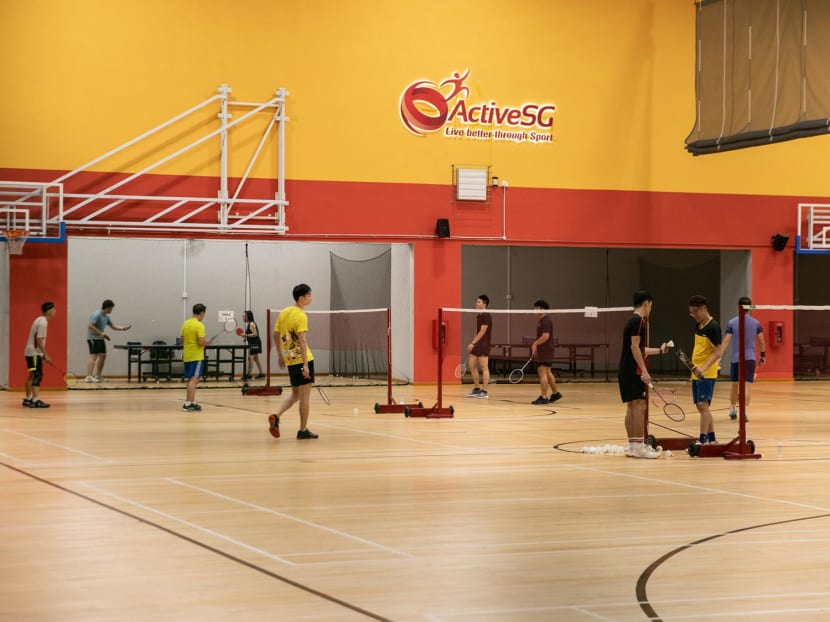Sports players, coaches not all game for SportSG's new pilot ballot system for booking courts under ActiveSG
SINGAPORE — Since March 1, Sport Singapore (SportSG) has been offering a “fairer” way of booking public sports facilities through a beta ballot system, but the feedback from some early users is that it needs some fine-tuning or risk pushing out regular users of the facilities.

A badminton court within Choa Chu Kang Sport Centre managed by ActiveSG, pictured on March 19, 2024.

This audio is AI-generated.
- Sport Singapore introduced a beta ballot system on March 1 to facilitate fairer bookings of public sports facilities
- This system randomly selects users for successful bookings, departing from the current first-come-first-served approach
- Some coaches and regular players were not enthusiastic about this pilot due to its unpredictable balloting outcomes
- Some suggested refining the existing "fastest fingers first" system instead, such as having a hybrid model or a waiting list
- The national sports governing body said in response that its aim is to meet evolving sporting needs through ongoing infrastructure development
SINGAPORE — Since March 1, Sport Singapore (SportSG) has been offering a “fairer” way of booking public sports facilities through a beta ballot system, but the feedback from some early users is that it needs some fine-tuning or risk pushing out regular users of the facilities.
The ballot system, available through ActiveSG, which manages more than 300 public sports facilities in Singapore, allows users to choose their desired facility and time slot.
They are later picked at random for successful bookings. This system deviates from the present one, which operates on a first-come-first-served basis.
ActiveSG is the national movement for sport and facilitates programmes and sporting activities for all ages and abilities.
Speaking to TODAY, several coaches and regular badminton players have raised concerns over the new system. They foresee difficulties in scheduling their lessons and regular playtime due to the unpredictability of the balloting outcomes.
They also suggested refining the existing “fastest fingers first” system instead of introducing a new one.
Other suggestions included having a hybrid system comprising the new and old ones, opening up school facilities on weekdays to increase "supply," and creating a waiting list for the old system.
HOW NEW ACTIVESG BETA BALLOT SYSTEM WORKS
The new ballot system, ActiveSG Beta, is on trial until May 31.
It offers users an equal chance to book high-demand, peak-hour slots at selected public sports facilities across eight sports — badminton, basketball, football, hockey, pickleball, table tennis, tennis and volleyball.
After logging in via Singpass, users may choose from facilities available in 16 locations, including Bedok, Bishan, Clementi, Chua Chu Kang, Jurong, Pasir Ris and Tampines.
Singpass is the digital gateway to the personal identification data of Singapore residents, allowing them to access various e-services.
In response to TODAY’s queries, SportSG, which is the national governing body for sports, said that the new balloting feature aims to help reduce the hassle of booking popular sports facilities during peak hours while mitigating the problems caused by errant users.
Bookings for off-peak hours will not be affected, it added.
During the Covid-19 pandemic, concerns arose over the use of bots to book sports facilities after the Singapore Island Country Club reported that bots were employed to secure coveted golfing time slots.
There was also a surge in demand for public badminton court bookings, leading some people to use bots to bypass the system and others to buy slots from resellers on social media channels such as Facebook and Telegram, as well as e-marketplace Carousell.
People who play sports as a social game had expressed frustration over their inability to secure court bookings at ActiveSG's sports halls and the OCBC Arena at the Singapore Sports Hub.
The OCBC Arena has six indoor multi-purpose halls, which can be used for badminton, basketball, table tennis, taekwondo, volleyball and other activities.
With the new beta system, users may ballot for slots 15 days in advance. “For example, slots on a Saturday will be open for balloting on the Saturday two weeks before the actual usage date,” SportSG told TODAY.
Bidders who are successful in the ballot will be notified by phone through SMS at 10am the day after the ballot, and will have until 11.59pm on the same day to make payment to secure their booking.
During the trial period, which runs alongside the old system, SportSG said that it would gather user feedback to improve the new system.
WHAT SPORTS PLAYERS AND COACHES SAY
Since the beta system is still new, not all of the coaches and players interviewed by TODAY have tried it.
However, those who did said that it was not ideal because it was difficult to gauge whether they may proceed with their scheduled lessons, unlike the existing system where they know straight away if the booking is confirmed or not.
Badminton coach Tan Ming Shun, 28, who regularly books courts via ActiveSG, said that the ballot system might benefit first-timers or social players, but not so much for regular players and coaches such as himself.
“If I’m used to playing with my group of students or friends at specific times, I risk losing my regular slots.”
For this reason, Mr Tan said that he prefers the “fastest fingers first” system to secure courts.
However, if given the choice to choose an ideal system, he believed that keeping a hybrid system would be best so that those who prefer the old system may still choose to book courts with it.
“It’s pure luck, like the lottery (whereas the old system is based on) effort, and you get rewarded for waking up early to book your slot.Ms Tian Qiuyan, captain of recreational tennis club OTM”
Another badminton coach, Mr Ashton Chen, 35, is on the same page. He could see how the ballot system can become frustrating for coaches if their sessions depended on a "lucky draw".
Mr Chen proposed splitting the quota for the courts so that registered coaches may book through the first-come-first-served system, whereas the ballot can be for all players.
“For example, if a school hall has eight badminton courts, perhaps four can be allocated for coaches using the old system, and the other four are available for balloting.
“This way, coaches can book their courts more regularly without worrying about a random selection disrupting their scheduled lessons,” he said.
Ms Tian Qiuyan, 40, who is captain of recreational tennis club OTM, said that the balloting system creates a lot more uncertainty.
“It’s pure luck, like the lottery (whereas the old system is based on) effort, and you get rewarded for waking up early to book your slot.”
As an alternative, Ms Tian said that it would help if ActiveSG allowed cancellations and introduced a waiting list for the old system.
“So if someone cancels, the next in line will have the slot and get charged for booking it. (ActiveSG) can also fix the latest cancellation timings, like no cancellation allowed if it’s within one or two hours of your booking.”
Similarly, badminton coach Eng Chin An, 26, who also prefers the old system, said that there should be a waiting list for the next interested party to take over the court, allowing the previous party to cancel and get a refund.
“And if the next interested party doesn’t accept within a specified period, then it automatically goes to the second in line.”
Product manager Kelvin Loh, 30, said that introducing a new system to replace the old one does not tackle the root problem, which is that there is more demand than supply.
“It would be better if ActiveSG and the Ministry of Education can work out a mutually beneficial arrangement, such as opening school sports facilities on weekdays instead of only on weekends," he said.
"Then the fees collected on these days will go to the schools, like paying a security guard who has to work overtime or for regular maintenance purposes."
Infotechnology professional Anthony Yeong, 43, who plays badminton with his children, said that the ballot system was a step in the wrong direction because it does not provide transparency on how the ballot is conducted.
“The stress of booking courts will not be reduced either, because we have to wait one day to know the result. If we fail to secure targeted slots, then we have another stressful task to seek an alternative.
“I would rather be under stress once with the system today than twice and for prolonged hours with the ballot,” he added.
As a possible solution, Mr Yeong also suggested a hybrid model, in which 10 to 20 per cent of the capacity goes to the ballot system, reserved for people with special needs.
“If hiring a warden for spot checks is too expensive and not sustainable, initiate a snap-and-reward system around it. This would allow anyone at the venue to validate and verify if the booker is present. For example, a photo of the person who made the booking would be publicly available without other private information.
“It would be better if more courts could be built, too,” he said.
In response to TODAY's queries about these suggestions, SportSG said on Tuesday that it has received much constructive feedback since the start of the trial.
"One of these (items of feedback) is to have more slots made available for booking. We will take these into account in the next iteration."
WHAT SPORTSG SAYS
TODAY also asked SportSG for more details on the ballot system, such as the percentage of facilities selected for balloting and whether plans are underway to roll it out for all facilities eventually, but it did not respond directly.
It replied to say that it would continue to develop and rejuvenate infrastructure to meet Singaporeans' evolving sporting needs, interests and aspirations under the Sports Facilities Master Plan, a key initiative of the national sports blueprint Vision 2030.
“We welcomed several new and rejuvenated sporting facilities recently, including ActiveSG Sport Village@Jurong Town and Delta Sport Centre.
“We are also building more facilities such as the Farrer Park Sport Centre, Punggol Regional Sport Centre and Toa Payoh Integrated Development, and refurbishing others such as Queenstown Sport Centre and soon, Hougang Sport Centre,” it added.
It also said that more than 370 facilities, including indoor sports halls and free-to-play fields, have been made available under the Dual-Use Scheme.
Under this scheme, school facilities such as outdoor fields and indoor sport halls at primary and secondary schools are open for public use, and bookings can be made through the ActiveSG mobile application.
“These collectively seek to address the needs of our diverse stakeholders, which include our citizens and our elite athletes, against the backdrop of a land-scarce Singapore.”










